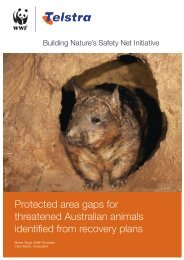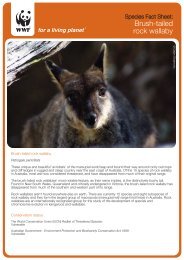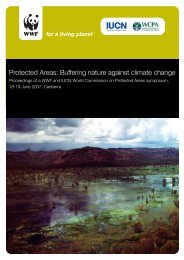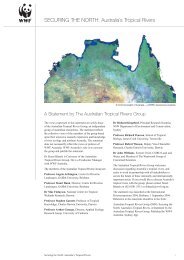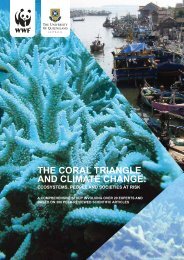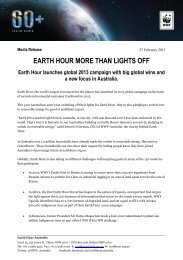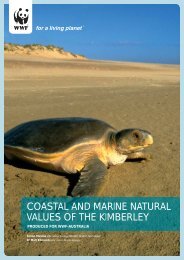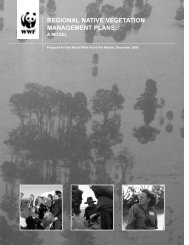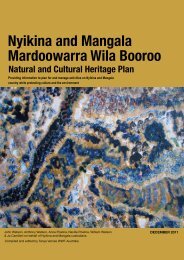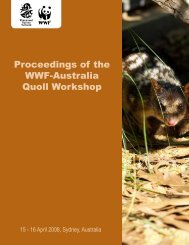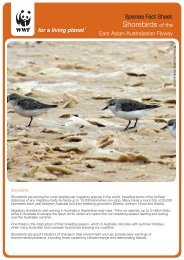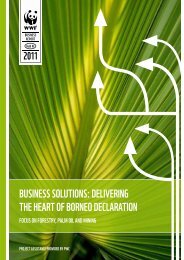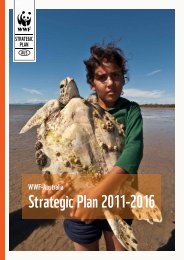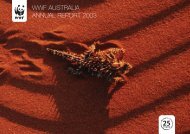Indigenous Peoples and Conservation Organizations
Indigenous Peoples and Conservation Organizations
Indigenous Peoples and Conservation Organizations
Create successful ePaper yourself
Turn your PDF publications into a flip-book with our unique Google optimized e-Paper software.
The Foi in Papua New Guinea 97<br />
a particular long house is the clan segment whose<br />
members reside there <strong>and</strong> share food together.<br />
Individuals inherit from their ancestors the right<br />
to use certain pieces of the clan’s territory, <strong>and</strong><br />
this right is often continuous so long as the l<strong>and</strong><br />
use is maintained. Right to unclaimed l<strong>and</strong> can<br />
be asserted by continuous use of it. Each long<br />
house community also has territories, usually<br />
hunting grounds held in common by the men.<br />
Traditionally Foi communities were not headed by<br />
chiefs, but were dominated by “big men” whose<br />
leadership was earned rather than inherited. Rather<br />
than invoking institutional authority, big men<br />
relied on their charisma <strong>and</strong> accomplishments to<br />
wield power. In any given long house, two or<br />
three men always emerged as acknowledged leaders<br />
who had earned prestige <strong>and</strong> built extensive<br />
personal connections with other communities.<br />
As we have seen with the sleeping arrangements<br />
<strong>and</strong> the discussion of l<strong>and</strong> rights <strong>and</strong> clan <strong>and</strong><br />
affinal ties, each community is like a web in its<br />
formation. The ability to negotiate the str<strong>and</strong>s<br />
of divergent interests <strong>and</strong> their connections to<br />
other communities shapes the pattern of leadership<br />
<strong>and</strong> the range of power <strong>and</strong> influence each<br />
leader can exert.<br />
Among the Foi, complex networks of marriage<br />
<strong>and</strong> matrifiliation between individual families<br />
cut across the grain of long house community<br />
organization so that a web of personal <strong>and</strong> familial<br />
alliances, rather than any formal political<br />
unity, link communities together. Individuals or<br />
individual families, by <strong>and</strong> large, alter the balance<br />
of forces, influences, <strong>and</strong> interests that link<br />
the various communities.<br />
However, the petroleum project has altered the<br />
terrain in which leadership functions <strong>and</strong> created<br />
new institutional forms for dealing with social<br />
<strong>and</strong> economic relations beyond the scope of traditional<br />
means. National legislation established a<br />
framework for setting up legally chartered<br />
Incorporated L<strong>and</strong> Groups (ILGs), L<strong>and</strong>owner<br />
Companies (LANCOs), <strong>and</strong> L<strong>and</strong>owner<br />
Associations (LAs). The Incorporated L<strong>and</strong><br />
Groups Act authorizes l<strong>and</strong>owner ILGs to negotiate<br />
with government, companies, <strong>and</strong> developers<br />
<strong>and</strong> receive royalty, equity, <strong>and</strong> compensation<br />
payments. The Business Groups Incorporation<br />
Act enables ILGs to establish LANCOs to<br />
engage in commerce, provide direct or indirect<br />
employment, <strong>and</strong> undertake contracts or subcontracts<br />
from developers. These two pieces of legislation<br />
have enabled customary l<strong>and</strong> groups to<br />
enhance their collective decision capacity <strong>and</strong><br />
create a more formal leadership structure.<br />
Collective decision capacity is further enhanced<br />
when ILGs b<strong>and</strong> together to form a L<strong>and</strong>owners<br />
Association to negotiate better terms from an<br />
outside developer. These new formalized institutions<br />
have played a significant role in helping<br />
l<strong>and</strong>owners get a fairer deal from developers <strong>and</strong><br />
the national <strong>and</strong> provincial governments, <strong>and</strong><br />
have generated spillover benefits for communities.<br />
But these institutions also suffer from clan<br />
rivalries, mismanagement, <strong>and</strong> corruption.<br />
They have not ended the old disputes, but moved<br />
them to a new battleground on which finding resolution<br />
requires new tactics <strong>and</strong> leadership skills.<br />
Major development activities such as logging,<br />
mining, or oil extraction tend to escalate existing<br />
l<strong>and</strong> disputes <strong>and</strong> revive dormant ones because of<br />
the revenue streams they generate. The 1997<br />
Social Impact Survey carried out for the Moran oil<br />
project near Lake Kutubu found a 700 percent<br />
increase in l<strong>and</strong> disputes within a five-month<br />
period <strong>and</strong> a doubling of disputes in the Kutubu<br />
petroleum development project area. Similar<br />
reports came from the Gobe petroleum project<br />
area not far from the territory of the Lower Foi.<br />
3.4 Gender Relations<br />
In Foi society, all major social process begins<br />
with the culturally defined <strong>and</strong> historically determined<br />
sexual separation of men <strong>and</strong> women <strong>and</strong><br />
distinction between male <strong>and</strong> female dominions.<br />
Traditionally, Foi women had no role in the leadership<br />
structure <strong>and</strong> were excluded in all decisions<br />
governing l<strong>and</strong> <strong>and</strong> other resources. The<br />
process of change initiated by developments such<br />
as the petroleum project has had little impact on<br />
the traditional status <strong>and</strong> role of women.<br />
Although men <strong>and</strong> women as married couples are<br />
responsible for generating food for the family,<br />
there are clearly defined gender roles in the division<br />
of productive labor. Traditionally, men take<br />
their wives <strong>and</strong> children <strong>and</strong> live deep in the bush<br />
for weeks or even months during the hunting season.<br />
The men do the hunting for flying foxes,<br />
cassowaries, birds, tree kangaroos, <strong>and</strong> snakes,<br />
<strong>and</strong> butcher, cook, <strong>and</strong> distribute the meat.<br />
Women help with fishing, <strong>and</strong> also forage for



